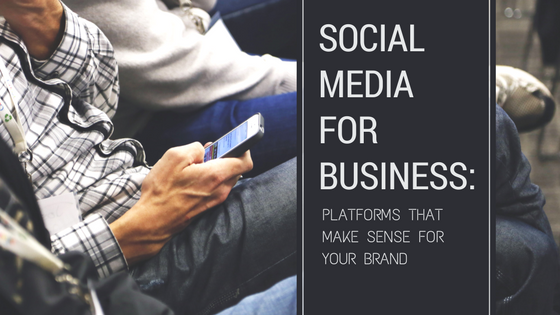Failing to incorporate social media into your marketing strategy is akin to refusing to upgrade your phone to a smart phone. Sure, you may not necessarily need the Internet and all of those apps at your fingertips, but it does make your life a whole lot easier doesn’t it? You can see success in business without social, but it can be significantly easier and faster (not to mention cheaper) to promote and grow with it.
Social media can be a powerful marketing tool for almost any company, brand, and business today. While there may be some debate on the ROI of social, there is no question that the benefits outweigh the potential negative aspects.
Using social as a marketing tool will help to grow your brand in more ways than one.
Did you know that by putting just six hours per week toward social media efforts, 66% of marketers see lead generation benefits? Or that 84% of B2B marketers use social media in some form?
But Which Platforms?
There are some platforms that perform better for different types of businesses. It is necessary to have a solid strategy in place when employing social media. Having a better understanding of the platforms themselves can help you achieve your goals.
We have created an infographic with some interesting stats about the "Big 5" platforms – Twitter, Facebook, Instagram, Pinterest, and LinkedIn – to help demonstrate not only the benefits, but the differences between the platforms. Knowing the strengths and weaknesses of these networks will significantly benefit your brand.
Twitter is particularly helpful when it comes to building connections with your key target audience. These connections can then lead to action by producing a network of loyal customers for your brand. As Twitter is such a fast paced platform, with over 6,000 Tweets sent per SECOND, it is necessary to stay current and post frequently in order to remain relevant. While there is value in having an account regardless, Twitter is most effective if you are active and truly getting involved with the discussions taking place. Not ready to post multiple times a day and actively listen to the constant conversation? Feel free to skip over Twitter.
Who Should Use It:
Any brand or individual can see success on Twitter, particularly those with a significant amount of content they want to share.
- Marketers
- Authors
- Technology Brands
Facebook.png?t=1526301888820&width=320&name=Social%20Media%20Infographic%20(2).png)
Facebook presents a great opportunity to build general brand awareness and affinity, make online sales, and create a solid foundation and platform where customers can discuss your brand and its products or services. Facebook’s effective targeting abilities allow you to target specific interests, industries or job titles which can benefit anyone within the wide demographic of the platform.
Who Should Use It:
Brands wanting to see a higher ROI from paid ads will appreciate Facebook’s ad platform. Also people that want to promote events and specific actions.
- Anyone selling direct to consumers
- Restaurants
- Professional Services
- Crowd-sourced startups and inventors
As social media evolves, it is becoming increasingly visual. Instagram’s highly graphic yet seemingly personal environment provides trust, authenticity, and relevance. This trust can provide a stable following and fierce loyalty for a brand.
Who Should Use It:
Companies with a young demographic and/or significantly visual brands will be the most successful on Instagram.
- Fashion
- Lifestyle
- Travel
Pinterest is also a solely visual platform but with clickable links and buyable content. This important distinction makes Pinterest a great platform for sales and direct traffic to your website. With the introduction of “Buy” buttons, viewers can buy directly from your Pinterest page, which is often why people are on Pinterest to begin with – to research a planned purchase. People are often on the platform with an intent to buy, so make it easy for them to find your products by having a Pinterest account.
Who Should Use It:
Basically anyone that uses Instagram should also be on Pinterest. Especially if you have a product to sell.
- Lifestyle
- Fashion
- Food
- DIY’ers
- Travel
With a more professional tone and tendency to link to longer form content, LinkedIn is typically regarded the most useful platform for business-to-business (B2B) companies.
Who Should Use It:
Businesses that have a lot to say about their area of expertise and want to be perceived as authorities, especially related to technology.
- B2B providers
- Job seekers
- Recruiters
Social media is a necessary part of a relevant marketing strategy. It provides a comfortable and relatable solution for people seeking help or advice. Don’t miss out on the connections, bring your business to the conversation.
Stay tuned for our next chapter on social for business. We will be discussing necessary engagement levels and what it takes to be successful with social.



 3301 Burke Ave. N, #360 | Seattle, WA 98103
3301 Burke Ave. N, #360 | Seattle, WA 98103